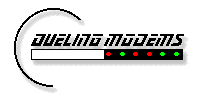
Member's Handbook - IntroductionINTRODUCTION NEWSREADERS WEB GATEWAY MEMBER NEWSGROUPS EMAIL CHAT WEB PAGES NETIQUETTE |
|
|
INTRODUCTION Using This Handbook Getting More Help About DM About the BBS About Email About Chat About Web Pages Glossary About This Handbook |
Using This HandbookWelcome to the Dueling Modems Member's Handbook. This handbook should answer your questions about our services and how to get the most out of them. This section, the Introduction, tells you about DM, gives you the highlights of our various services, and has links to other sources of specific information. The sections that follow provide more detailed advice on configuring your software to work with DM and resolving problems. Throughout this handbook, the term your.id refers to your Dueling
Modems userid.
About Dueling ModemsDueling Modems was founded by Nic Grabien in 1996; some of our Forums, or communities, have been active in cyberspace for as long as ten years, on Genie and other services that pioneered the concept of virtual communities. Services and ForumsEach DM Forum (or subject area) is a virtual community hosted by a Sysop and his or her staff. There are dozens of Forums available to DM members. Individual Forums offer online conferences in the BBS, web sites, file libraries, and real-time Chats (using the Internet Relay Chat protocol). (For an up-to-date index of available Forums and their offerings, see our Forum pages.) Your monthly DM membership fee includes access to all of our Forums (except for private Forums, which we host for members of professional organizations, writers' workshops, or other affinity groups). Dueling Modems also provides commercial web-hosting and other services. (To learn more about these, check our Commercial Services page.) PoliciesDueling Modems' policies are outlined in these documents:BBS Discussion GroupsDueling Modems' BBS is a conferencing system based on the NNTP news protocol. Discussion Groups are maintained as non-propagated NNTP newsgroups on the DM server. BBS Discussion Groups may be read with an internet browser or a newsreader. Which one you want to use is based on your personal preferences.
Members' personal Groups are part of our Members Forum (your
Group, if you requested one, can be found at dm.members.your.id).
Your Dueling Modems account includes a POP3 email address, your.id@dm.net. DM will use this address to contact you, and this will be the reply-by-email address if you post through the Web Gateway, so it's important to read your DM mail. Your email can be forwarded to an email address at your office, school, or internet service provider (ISP), or we can retain it for you at DM; in that case you'll want to configure your email software to read your mail on our server. The email address your.id@sfrt.com will also work.
DM Forums sponsor real-time Chats using the IRC (Internet Relay Chat) protocol. In addition, the Chat Forum hosts general-interest Chats. Chats are open to DM members and to the public. Set your Chat software to irc.dm.net to connect to DM. For detailed information on Chat software, netiquette, commands,
and jargon, see the
Chat Forum web page.
If you asked for web space when you joined DM, you will have a home page at http://www.dm.net/~your.id. We'll create a temporary "placeholder" home page for you, but you'll probably want to create your own page. Glossary
About the Member's HandbookThis is the Dueling Modems Member's Handbook, created by Paula Kate Marmor with significant input from Nic Grabien and the staff of Dueling Modems. We welcome your suggestions for improving this document. Please send your comments and suggestions to sysop@dm.net.
|
|
INTRODUCTION NEWSREADERS WEB GATEWAY MEMBER NEWSGROUPS EMAIL CHAT WEB PAGES NETIQUETTE
Reviewed 15 February 2000 nz |
|